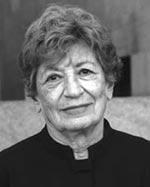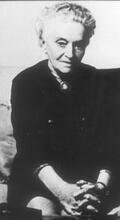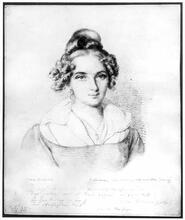Helene Deutsch
Psychoanalyst Helene Deutsch (1884 – 1982) expanded on theories of her mentor, Sigmund Freud, to develop her own outlook on women’s psychology, writing the first book with a psychoanalytic perspective on the subject.
Institution: Gidal-Bildarchiv im Salomon Ludwig Steinheim-Bildarchiv für deutsch-jüdische Geshichte e.g., Duisberg.
Helene Deutsch was a mentee of Sigmund Freud’s and the first psychoanalyst to write a book on female psychology. Although she remained loyal to Freud’s conceptual framework, her emphasis on female libido and the significance of motherhood was an outgrowth of her own insight. Having worked at Julius Wagner Jauregg’s clinic and undergone a year-long personal analysis with Freud, Deutsch emerged in the 1920s as one of the most successful teachers in the history of psychoanalysis. In 1924 in Vienna she became the first woman to head a psychoanalytic clinic. She immigrated to Boston in 1935, where her reputation preceded her. During WWII she wrote a two-volume work, The Psychology of Women. Her books were filled with a unique and valuable cast of female histories.
In 1923, Helene Deutsch became the first psychoanalyst to write a book about female psychology, called Psychoanalysis of the Sexual Functions of Women in English. Her interest in the subject, along with that of Karen Horney, helped to push her mentor Sigmund Freud, who did not like being left behind, into writing articles about female psychology. When Deutsch was completing her manuscript, she wrote to her husband, Felix, “It brings something new to this terra incognita in analysis—I believe, the first ray of light on the unappreciated female libido.” For her to draw attention to the female libido in that era was implicitly to amend Freud’s own outlook. At the same time, Deutsch was pioneering the importance of motherhood. Other psychoanalysts of the period, such as Otto Rank, Sandor Ferenczi, and Georg Groddeck, were also intrigued by the neglected role of mothering, but Deutsch was the one to insist on its special significance for female psychology. Although she always remained loyal to Freud’s conceptual framework, her writings were an outgrowth of her own personal experiences and insight.
Early Life & Education
Deutsch was born on October 9, 1884, in Przemysl, Poland. Her parents were Jewish, but she also grew up as a Polish nationalist. As early as 1898, she was emotionally involved with a much older—and married—man, Herman Lieberman, who was a local Social Democratic leader. They had an affair that lasted for years, and, in her extreme old age, it seemed to Deutsch to be the one great romance of her life. Although formal schooling for women was impossible in late nineteenth-century Poland, she received private tutoring, which enabled her to enroll at the University of Vienna in 1907. There, she studied medicine and was, from the outset, interested in a psychiatric career.
While spending a year in Munich in 1910–1911, she finally broke off with Lieberman, who since 1907 had been a Polish deputy in the Parliament in Vienna. In Munich, she met her future husband, Felix Deutsch, in medical school, and the two were married in 1912. He was already a respected Viennese internist as well as a passionate Zionist.
Developing Her Own Insights & Reputation
At the University of Vienna, Deutsch became the student of neurologist Julius Wagner-Jauregg. Since women were not allowed to hold clinical psychiatric posts at the university, Wagner-Jauregg helped Deutsch to obtain a study position at the clinic of Emil Kraepelin in Munich in 1914. When World War I broke out, physicians were needed by the Austrian military, and Deutsch found new and welcome responsibilities thrust upon her at Wagner-Jauregg’s clinic. She worked unofficially as one of his assistants, a high post that, as a woman, she was not permitted formally to assume.
In the fall of 1919, she left Wagner-Jauregg’s clinic in order to undertake a personal analysis with Freud in Vienna, which lasted about a year. She had given birth to a son, Martin, in 1917, and was feeling uncertain about herself as both a mother and a wife. She had been on the periphery of Freud’s circle for some years, although she became a member of the Vienna Psychoanalytic Society only in February 1918. While for some students of Freud—particularly exceptionally talented male pupils—Freud could be a hindrance to their independent development, Deutsch found that Freud managed to release her most creative talents. She was able to write as Freud’s adherent and at the same time fulfill her own needs for self-expression. Her professional audience responded to her work as that of one of the most prominent leaders in psychoanalysis. She was no mere imitator of Freud but contributed her own insights within his system of thought. Later, in 1923–1924, she went to Berlin for a second analysis with Karl Abraham, where she also learned about the Berlin Psychoanalytic Institute’s training facilities.
The 1920s were perhaps Deutsch’s most creative period. Not only did she make some of her most notable psychological contributions, but she also emerged as one of the most successful teachers in the history of psychoanalysis. In 1924, she became the first woman to head a clinic, the new Vienna Psychoanalytic Training Institute, where she assessed all candidates who came to Vienna for instruction in analysis. In addition to her role on international training committees and her reputation as a lecturer, she was much sought-after as a training analyst and as a supervisor. Her seminars were remarkable and memorable experiences for students, and she trained a host of future psychiatrists and therapists, including the next generation of the most prominent “classical” analysts. Her 1930 book Psychoanalysis of the Neuroses was a memorable teaching aid.
Life & Career in Boston
In Vienna, Deutsch’s caseload became two-thirds American and, in 1930, she briefly visited the United States to attend the First International Congress of Mental Hygiene held in Washington, D.C. By this time, she was considering relocation to the United States. One potential difficulty was finding a suitable position for her husband, a nonpracticing member of the Vienna Psychoanalytic Society who had also been Freud’s personal physician when Freud first contracted cancer in 1923.
Boston, Massachusetts, appeared to offer the best opportunities for both Deutsches. A new facility, the Psychoanalytic Training Institute, was being established there at the same time that Dr. Stanley Cobb was creating a psychiatric department at the famous Massachusetts General Hospital. Cobb was interested in psychosomatic medicine, Felix’s specialty, so he was eager to attract the couple. Helene came to Boston in the fall of 1935 with her son Martin, who then enrolled in college; a few months later, Felix finally decided to leave Vienna and arrived in Boston in January 1936.
Deutsch’s mental stylishness and her reputation as a favored colleague of Freud earned her great respect at the Boston Psychoanalytic Training Institute. The analysts there had been mainly students abroad when she was already established as a teacher and lecturer. Although she was not eager once again to be involved in the politics of training students, she functioned as president of the Boston Psychoanalytic Society from 1939 to 1941.
The Psychology of Women: Securing Her Position
During World War II, Deutsch wrote a two-volume work, The Psychology of Women, published in 1944–1945. While remaining loyal to Freudian psychoanalysis, Deutsch added her special outlook on women’s psychology, derived from her own personal experience and clinical observations. She wrote, for example, about women’s inner conflict between motherliness and eroticism, a conflict that she herself experienced. She recognized that her preoccupation with her work had cost her a heavy price in terms of emotional closeness with both her husband and her son. With the advantage of hindsight, she emancipated herself from theoretical dogmatism and discouraged her students from following her example too closely.
Deutsch characteristically emphasized the realistic conflicts of young women. Her books were filled with female case histories of which other psychoanalysts of the time had limited knowledge. She was not afraid to sound old-fashioned about how sexual experience could take the place of love. She thought that in order to understand pathologic behavior correctly, we must first realize what constitutes normal development. The thrust of Deutsch’s argument was that a woman’s intensified inner life becomes a unique source of human superiority. She highlighted the sources of a woman’s capacity to identify with others. Probably her most famous clinical concept was that of the “as if” personality, a false affect that was neither neurotic nor psychotic. To Deutsch, victimization was a central danger of female masochism, while intensified self-love could be a self-preserving counterweight, protecting a woman from her masochistic tendencies.
Karen Horney had caricatured some of Deutsch’s writings in the 1930s, but Deutsch’s position seemed secure by the early 1940s. Her temperament was so untruculent that she answered Horney’s criticisms with only a few mild footnotes in The Psychology of Women.
End of Life
Deutsch’s old age was as remarkable as any other feature of her life. She kept on sustaining friends and acquaintances almost right up to her death in 1982 at age ninety-seven in Cambridge, Massachusetts. Her interest in other people helped keep her alive for a long time. After her husband died in 1964, Deutsch’s publications seemed to accelerate. Her collection of essays called Neuroses and Character Types appeared in 1965 and two monographs were published in the late 1960s. Her autobiography, Confrontations with Myself, was published in 1973.
Deutsch retained her intellectual vitality right to the end. Typically, she questioned whether generations of analyzed people were any happier after their treatment. Privately, she thought that her own life had been ruined by too much denial. She believed that she had failed as a mother, which caused her to redouble her efforts with her two grandsons. She hid her tragic feelings from most people, who saw in her a joyful, fascinating, very competent woman with a seemingly inexhaustible supply of energy. If she had been more accepting of herself, she might have formulated ideas about human development and normality more in keeping with her own unconventional experience and enabled others to feel more at ease in defying conformist pressures.
Selected Works
Confrontations with Myself: An Epilogue. New York: W.W. Norton & Company, 1973.
Neuroses and Character Types: Clinical Psychoanalytic Types. New York: International Universities Press, 1965
Psychoanalysis of the Neuroses. N.p.: Hogarth Press, 1951
A Psychoanalytic Study of the Myth of Dionysus and Apollo. New York: International Universities Press, 1969.
The Psychology of Women: A Psychoanalytic Interpretation. Volume 1: Girlhood. New York: Grune & Stratton, 1944.
The Psychology of Women: A Psychoanalytic Interpretation. Volume 2: Motherhood. New York: Grune & Stratton, 1944.
Selected Problems of Adolescence: With Special Emphasis on Group Formation. New York: International Universities Press, 1967.
The Therapeutic Process, the Self, and Female Psychology: Collected Psychoanalytic Papers. Edited by Paul Roazen. New Brunswick: Transaction Publishers, 1992.
Zur Psychoanalyse der weiblichen Sexualfunktionen [Psychoanalysis of the sexual functions of women]. Edited by Paul Roazen (1923; translated, 1991).
EJ
Roazen, Paul. Freud and His Followers (1975, 1992), and Helene Deutsch: A Psychoanalyst’s Life (1985; reprint with new introduction, 1992), and “A Note on the Vienna Psychoanalytic Society: Felix Deutsch’s Letters, 1923 and 1935.” Journal of the History of the Behavioral Sciences (October 1984).







